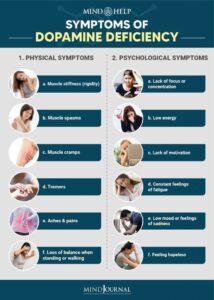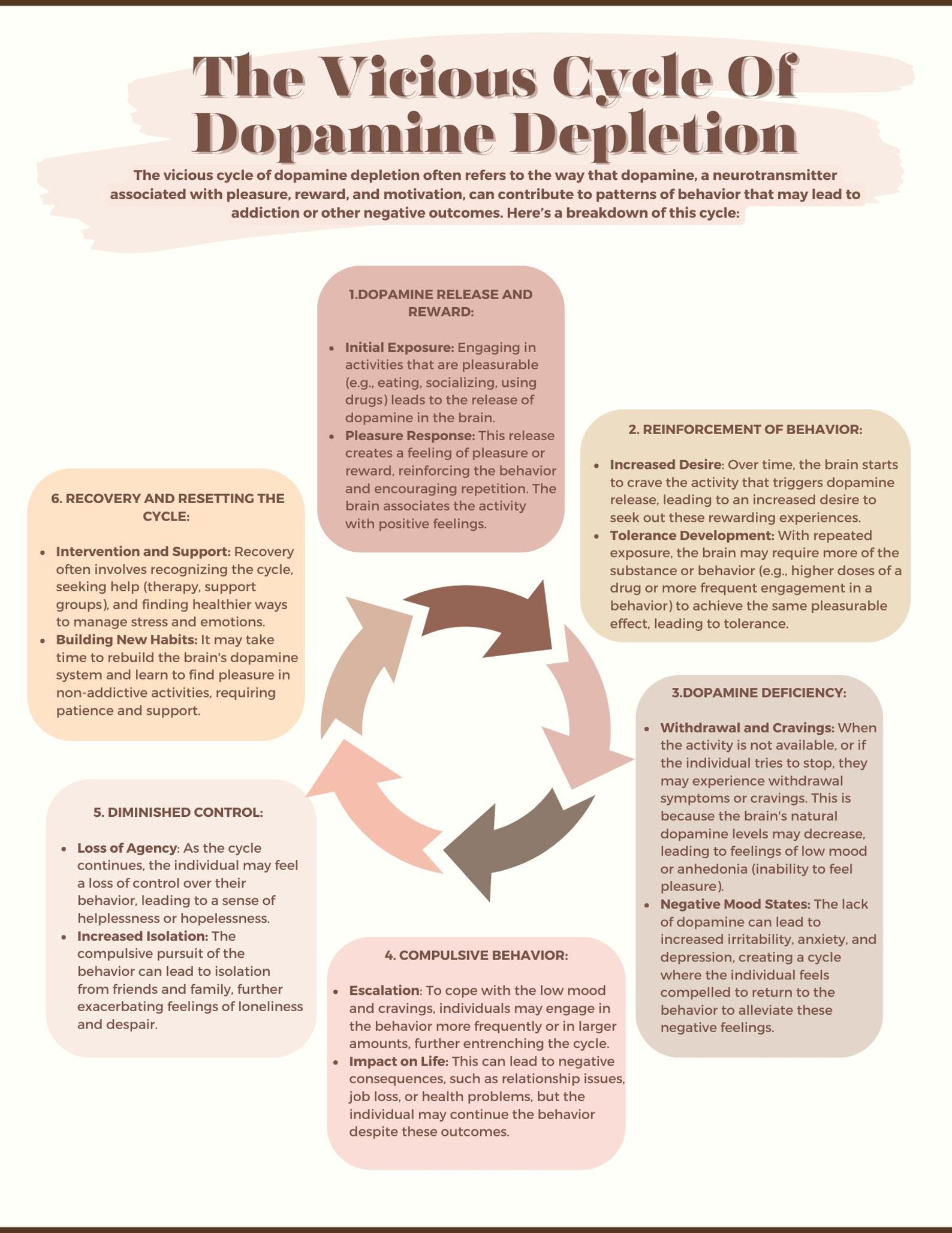Is dopamine the silent conductor of our well-being, orchestrating a symphony of emotions, movements, and motivations? A shortfall in this crucial neurotransmitter can subtly, yet profoundly, disrupt the very essence of our daily lives, leading to a cascade of both mental and physical challenges.
Dopamine, often hailed as the 'feel-good' neurotransmitter, is far more than just a fleeting sensation of pleasure. It acts as a vital messenger within the brain, influencing a complex array of functions from motor control and reward-motivated behavior to cognitive processes and sleep regulation. A deficiency in dopamine can manifest in a multitude of ways, often subtly at first, before gradually escalating into more pronounced symptoms. This can significantly impair an individual's quality of life. The ramifications of a dopamine deficit are far-reaching, impacting mood, motivation, memory, and even physical coordination. Therefore, understanding the complexities of dopamine deficiency is paramount to identifying, managing, and potentially mitigating its effects.
Below, we'll delve deeper into this intricate subject, examining the multifaceted aspects of dopamine deficiency. We'll explore the various symptoms, potential causes, and available treatment options, offering a comprehensive overview of this frequently misunderstood condition.
Dopamine deficiency isn't a monolithic entity; it's a spectrum of conditions that can arise from a variety of underlying factors. The causes can range from genetic predispositions and neurodegenerative diseases to lifestyle choices and environmental influences. The symptoms are equally diverse, making diagnosis a nuanced and often challenging process. The good news is that there are effective ways to manage and treat dopamine deficiency. This can range from lifestyle adjustments and dietary modifications to medication and therapy. It's an intricate subject, with many different factors influencing and affecting it, so here is the information in a way that will help to get a better understanding of this.
This article will aim to deliver a comprehensive understanding of the topic, focusing on various aspects of dopamine deficiency. The following table provides a detailed look at a hypothetical individual, offering an insightful perspective that delves into the multifaceted nature of dopamine and its impact on daily life.
| Aspect | Details |
|---|---|
| Name | Dr. Evelyn Reed |
| Age | 52 |
| Occupation | Neurologist & Researcher |
| Background | Dr. Reed is a renowned neurologist with over 25 years of experience specializing in neurochemistry and neurotransmitter disorders. She holds a Ph.D. in Neuroscience from the University of Amsterdam. Her research focuses on the role of dopamine in neurological diseases, and she has published numerous peer-reviewed articles. |
| Professional Achievements |
|
| Current Research | Focuses on novel therapeutic approaches to treat Parkinson's disease and other dopamine-related disorders. She is also exploring the relationship between dopamine levels and cognitive function in aging. |
| Personal Interests | Enjoys reading scientific literature, attending neuroscience conferences, and spending time with her family. |
| Reference Website | Example Neurology Institute (Replace with a real, relevant website) |
One of the most prevalent symptoms of a dopamine deficiency is a noticeable shift in mood. Individuals might experience feelings of sadness, hopelessness, or even a complete loss of interest in activities they once found pleasurable. This anhedonia, as it's known in clinical terms, is a hallmark of low dopamine levels. This crucial neurotransmitter plays a crucial role in our brain's reward system. It allows us to experience pleasure and to seek out rewarding experiences. When dopamine levels are inadequate, this system becomes less effective, resulting in a reduced capacity to experience joy and a diminished interest in activities. This is particularly true in the face of chronic stress or prolonged periods of adversity. Low dopamine levels can significantly contribute to the development or exacerbation of mental health conditions. These include depression, anxiety, and even, in some cases, bipolar disorder.
Beyond the realm of mental health, dopamine deficiency can also wreak havoc on physical well-being. Motor control, a critical function regulated by dopamine, can be severely impaired. People experiencing low dopamine levels might exhibit symptoms similar to those seen in Parkinson's disease, such as tremors, rigidity, and slowed movements. This impairment can manifest in subtle ways, like difficulty with fine motor skills, or in more obvious forms, such as a shuffling gait. The effect on movement can significantly restrict daily activities. This can impact the ability to perform everyday tasks and participate in social interactions, leading to a decline in overall physical fitness.
Moreover, the impact of dopamine deficiency extends into the cognitive sphere. Dopamine is instrumental in various cognitive processes, including attention, memory, and executive functions. A deficit can manifest as difficulties with concentration, impaired memory recall, and challenges in planning and decision-making. The ability to focus on tasks and process information can be significantly compromised. The consequences of these cognitive deficits are far-reaching, impacting work performance, academic achievement, and the overall ability to navigate daily life with efficiency and effectiveness.
The causes of dopamine deficiency are multifactorial, encompassing genetic predispositions, lifestyle choices, and underlying medical conditions. Certain genetic mutations can affect the production, transport, or utilization of dopamine. Exposure to toxins or environmental stressors can also play a significant role. Furthermore, neurodegenerative diseases, such as Parkinson's disease, are characterized by the progressive loss of dopamine-producing neurons in the brain. In addition, certain lifestyle factors, such as chronic stress, poor diet, and inadequate sleep, can also contribute to dopamine depletion. Therefore, a comprehensive assessment is necessary to identify the underlying cause of a deficiency, allowing for a tailored treatment plan.
Diagnosing dopamine deficiency can be a complex undertaking. There isn't a single definitive test to measure dopamine levels directly in the brain. However, doctors often rely on a combination of methods to assess the condition. These methods include a thorough review of a patient's medical history, a detailed evaluation of their symptoms, and a physical examination. Various diagnostic tools, such as neurological assessments, may be employed to evaluate motor function and cognitive abilities. In some instances, imaging techniques, such as MRI or PET scans, may be used to assess brain structure and function.
Treatment options for dopamine deficiency vary, depending on the underlying cause and the severity of the symptoms. Medication often plays a central role in managing dopamine deficiency. Dopamine agonists, such as pramipexole or ropinirole, can mimic the effects of dopamine, stimulating dopamine receptors in the brain. In Parkinson's disease, L-DOPA, a precursor to dopamine, is often used to increase dopamine levels. Dietary modifications and lifestyle adjustments can also play a significant role in managing the condition. A diet rich in tyrosine, an amino acid that serves as a building block for dopamine, may be beneficial. Regular exercise and adequate sleep are also essential for supporting healthy dopamine levels. In addition, therapies such as cognitive-behavioral therapy (CBT) and support groups can help individuals cope with the emotional and psychological effects of dopamine deficiency. It's also important to address the underlying cause of the deficiency. This might involve managing other health conditions or addressing lifestyle factors.
Certain supplements can also be useful. Tyrosine, as mentioned earlier, is an amino acid precursor to dopamine and can be taken as a supplement. Other supplements, such as L-phenylalanine, which converts to tyrosine, and certain B vitamins, which are involved in the synthesis of neurotransmitters, may also be helpful. However, it is essential to consult with a healthcare professional before starting any new supplements, as they can interact with medications or have side effects.
Dopamine deficiency syndrome, a genetic disorder, highlights the impact of dopamine transport issues. It specifically affects dopamine transport in the brain and can cause significant movement problems. This rare condition underscores the importance of understanding the genetic component of dopamine-related disorders. While it's a distinct condition, it emphasizes the importance of early detection and comprehensive management strategies.
The prognosis for dopamine deficiency varies depending on the underlying cause, the severity of the symptoms, and the effectiveness of the treatment. With appropriate medical care, lifestyle adjustments, and therapeutic interventions, many individuals with dopamine deficiency can experience significant improvements in their symptoms and overall quality of life. Early diagnosis and intervention are crucial for maximizing the chances of a positive outcome. The key is a comprehensive and tailored approach that addresses the underlying causes, manages the symptoms, and supports the individual's overall well-being. Continual monitoring and adaptation of the treatment plan are also essential. This will ensure the best possible outcome over time.
Understanding the intricate role of dopamine in our lives sheds light on the importance of maintaining healthy levels of this neurotransmitter. Recognizing the symptoms, understanding the potential causes, and seeking appropriate treatment are all vital steps in addressing this complex condition. Whether it's through medication, lifestyle changes, or therapeutic interventions, there are effective strategies available to help manage dopamine deficiency and improve the quality of life for those affected. It's an area ripe for further research and the development of novel therapeutic approaches, aiming to offer hope and more effective solutions for those struggling with its effects.
When dopamine levels are low, the brain area dealing with anxiety and reward may work less effectively. This can increase the difficulty in managing anxious thoughts and emotions. Dopamine is also important in anticipating and responding to rewards or threats. A deficiency in dopamine can lead to an imbalance in this system, potentially causing increased feelings of anxiety, and impacting the ability to find pleasure in everyday activities.
In essence, dopamine deficiency is a multifaceted condition with far-reaching implications for both mental and physical health. Recognizing the signs, understanding the underlying causes, and seeking appropriate treatment are crucial steps in navigating this often challenging, yet manageable, health concern. It is a subject deserving of continued research, offering the promise of even better treatments and a brighter future for those affected.



